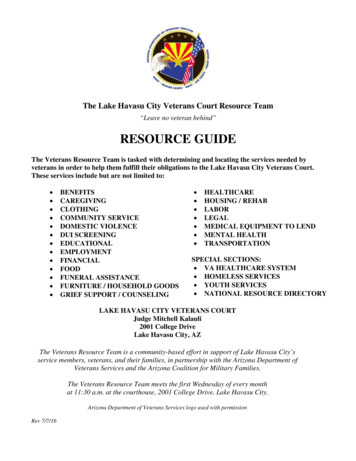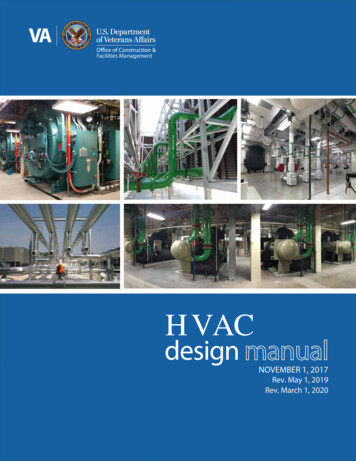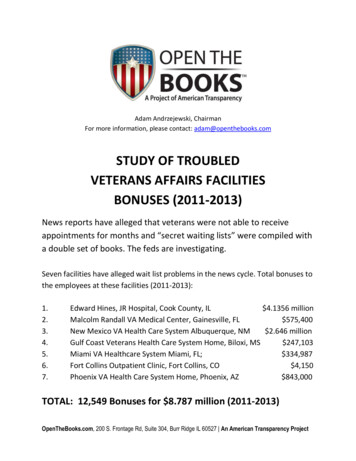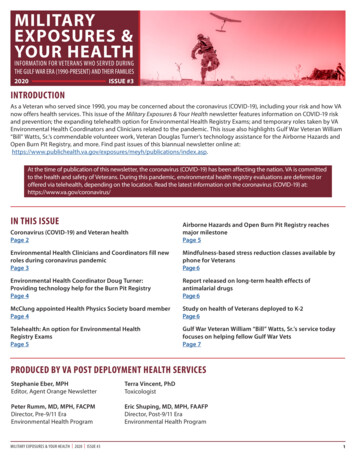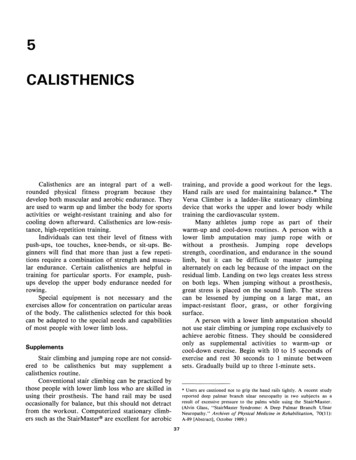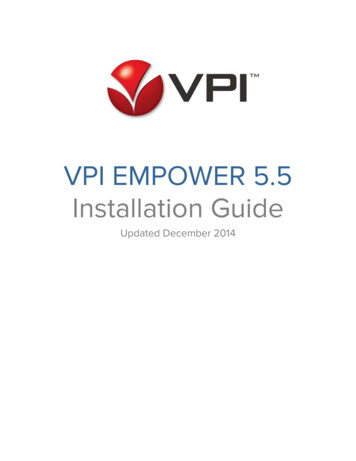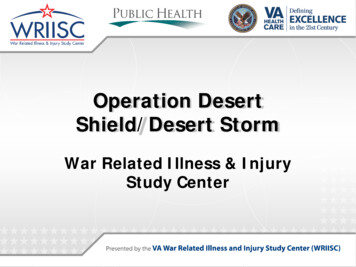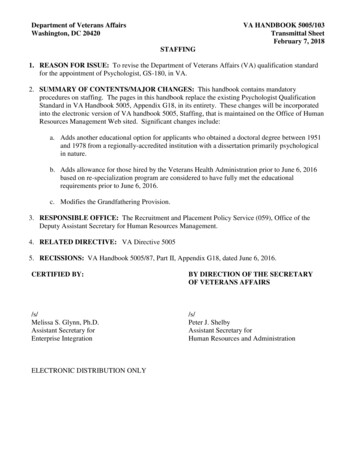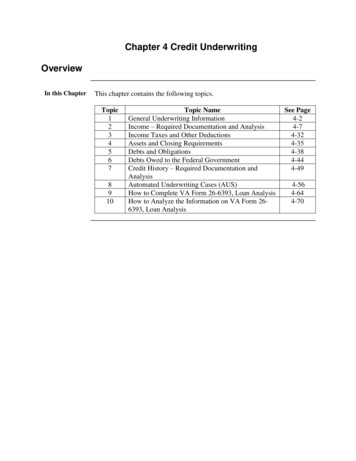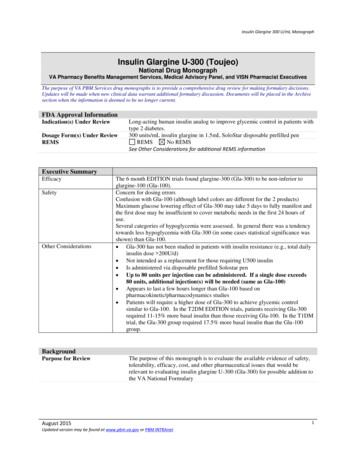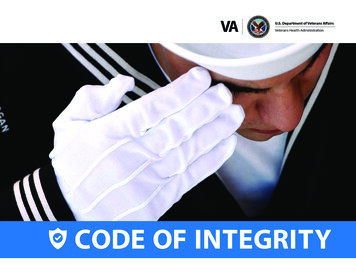
Transcription
CODE OF INTEGRITY
VA CORE VALUESVA’s five core values underscore the obligations inherent inVA’s mission: Integrity, Commitment, Advocacy, Respect andExcellence. The core values define “who we are,” our cultureand how we care for Veterans and eligible beneficiaries. Ourvalues are more than just words—they affect outcomes inour daily interactions with Veterans and eligible beneficiariesand with each other. Taking the first letter of each word—Integrity, Commitment, Advocacy, Respect, Excellence—creates a powerful acronym, “I CARE,” that reminds each VAemployee of the importance of their role in this Department.These core values come together as five promises we makeas individuals and as an organization to those we Act with high moralprinciple. Adhereto the highestprofessional standards.Maintain the trust andconfidence of all withwhom I engage.Work diligently toserve Veterans andother beneficiaries. Bedriven by an earnestbelief in VA’s mission.Fulfill my individualresponsibilitiesand organizationalresponsibilities.Be truly Veterancentric by identifying,fully consideringand appropriatelyadvancing the interestsof Veterans and otherbeneficiaries.Treat all those I serveand with whom Iwork with dignityand respect. Showrespect to earn it.Strive for the highestquality and continuousimprovement. Bethoughtful anddecisive in leadership,accountable for myactions, willing to admitmistakes and rigorous incorrecting them.
Table of Contents1.0 Introduction. 16.0 Integrity as a Federal Employee. 141.1 What is the Code of Integrity?. 11.3 Don't we have a Code of Conduct?. 11.2 Why do we need the Code of Integrity?. 11.4 Who must follow the Code of Integrity?. 16.1 General Considerations.146.2 Relevant Laws, Regulations and Policies.156.3 Federal Employee Points of Contact.156.4 Federal Employee Questions and Answers.162.0 Responsibilities. 27.0 Points of Contact. 172.1 Adherence. 22.2 Raising Concerns and Reporting Violations. 22.2.1 Obligation to Report. 22.2.2 Non-retaliation. 32.3 Whom to Contact with Questions or Concerns. 37.1 Standards of Conduct for Employees ofthe Executive Branch and Criminal Conflict of Interest Laws.177.2 Criminal Matters.177.3 Discrimination, Harassment and Dispute Resolution.177.4 VHA Revenue Cycle Financial andBusiness Operations.187.5 Privacy.187.6 Patient Safety and Quality Concerns.187.7 Information Security.197.8 Research Non-Compliance.197.9 Health Care Ethics.197.10 Occupational Health and Safety.197.11 Finance.197.12 Prohibited Personnel Practices, Whistleblower Disclosures, Hatch ActViolations of the Uniformed Services Employment and ReemploymentRights Act (USERRA).203.0 Integrity in the Workplace. 43.1 General Considerations. 43.2 Relevant Laws, Regulations and Policies. 43.3 Workplace Points of Contact. 53.4 Workplace Questions and Answers. 54.0 Integrity in Care for Veterans and in Conduct of Research. 74.1 General Considerations. 74.2 Relevant Laws, Regulations and Policies. 84.3 Care for Veterans and Conduct of Research Points of Contact. 94.4 Care for Veterans and Conduct of Research Questions and Answers.105.0 Integrity in Financial Matters and Asset Protection. 115.1 General Considerations.115.2 Relevant Laws, Regulations and Policies.115.3 Financial Matters and Asset Protection Points of Contact.125.4 Financial Matters and Asset Protection Questions and Answers.13
1.0 Introduction1.1 What is the Code of Integrity?1.2 Why do we need the Code of Integrity?The Code of Integrity provides guidance to ensure thatwork at VHA is accomplished not only in accordance with allapplicable laws, regulations and policies, but also with thespirit of these laws, regulations and policies. This documentoutlines how VHA employees conduct themselves, how totreat others and how to perform work with integrity at VHA.The Code of Integrity is a consolidated document that willsimplify and connect the key laws, regulations and policiesthat apply to VHA.As a minimum standard, VHA employees are expected tocomply with all applicable laws, regulations and policies. TheCode of Integrity demonstrates the commitment to I CAREvalues in the workplace and to the ethical values that guidewhat should be done, beyond what must be done. The Codeof Integrity emphasizes VHA employees’ responsibilities tooperate with integrity and the highest ethical standards. It isa consolidated document with various references and pointsof contact for specific matters of integrity.1.3 Don't we have a Code of Conduct?1.4 Who must follow the Code of Integrity?While there are Standards of Ethical Conduct for Employeesof the Executive Branch and criminal conflicts of interestlaws applicable to all Federal employees, the Code ofIntegrity is specific to VHA employees. The Code of Integrityconsolidates applicable policies, laws and regulations in asingle document for easy reference. It further demonstratesthe commitment to integrity in interactions with fellowemployees, treatment of Veterans and other beneficiaries,research conducted, financial matters and asset protection.The Code of Integrity applies to all VHA employees.1DEPARTMENT OF VETERANS AFFAIRSINTEGRITYMore than technical compliance with the laws andregulations, integrity means having the sort of characterwhere behavior and actions are trusted to be ethical,reflective of agency values, without the intent or effectof being false or misleading and beyond minimalcompliance with laws, regulations and policies.
SPEAK UP AND LISTEN UP2.0 Responsibilities2.1 AdherenceAll VHA employees are responsible for being familiarwith this Code of Integrity and complying with the laws,regulations and policies that apply to their work. Pleasereview the reference links in each of the sections, as they willlead you to the relevant source information for each concept.2.2 Raising Concerns and Reporting Violations2.2.1 Obligation to ReportEmployees have a legal obligation to report violationsof criminal law to their supervisor, VA Police and/or theOffice of Inspector General. Federal regulations provide thefollowing guidance regarding an employee’s duty to report:All VA employees with knowledge or information aboutactual or possible violations of criminal law relatedto VA programs, operations, facilities, contracts, orinformation technology systems shall immediately reportsuch knowledge or information to their supervisor, anymanagement official, or directly to the Office of InspectorGeneral (38 C.F.R. 1.201).Moreover, Federal regulations provide the followingguidance regarding reporting fraud, waste and abuse.Employees shall disclose waste, fraud, abuse, andcorruption to appropriate authorities(5 C.F.R. 2635.101(b)(11)).Employees are also encouraged to seek guidance regardingconcerns and ask questions to prevent, identify andremediate suspected misconduct at VHA. Additionalinformation on whom to contact can be found in 2.3. Whomto Contact with Questions or Concerns.CODE OF INTEGRITY2
2.2.2 Non-retaliation2.3 Whom to Contact with Questions or ConcernsFederal employees who act as whistleblowers and exposeand report certain kinds of agency misconduct are protected(5 U.S.C. §2302(b)(8)). This whistleblower protection extendsto disclosures that an employee reasonably believesconstitutes a violation of any law, rule, regulation or grossmismanagement, gross waste of funds, abuse of authority ora substantial and specific danger to public health or safety.A Federal employee authorized to take, direct others to take,recommend or approve any personnel action must not take,fail to take, threaten to take or threaten to fail to take anypersonnel action against an employee because of protectedwhistleblowing.VHA has several resources available to assist with raisingand reporting concerns. Managers and senior leadershipin the facility or program office are available to addressconcerns and answer questions, as they are familiar withlaws, regulations and policies that apply to employees’ work.Apart from an employee’s duty to report actual or possiblecriminal violations as well as complying with Standards ofEthical Conduct for Employees of the Executive Branch,employees are encouraged, but not required, to first discusstheir questions or concerns on compliance and integrityissues with their immediate supervisor. If an employeefeels they are unable to resolve their questions or concerns,employees are encouraged to escalate to the facilitymanagement or local points of contact. For questions orconcerns related to specific matters of integrity outlined inthe sections below, please contact the appropriate points ofcontact listed.No disciplinary or punitive action will be taken against staffor visitors who report patient safety and/or quality of careconcerns to The Joint Commission (APR 09.02.01, The JointCommission).Decision Making Guidance Regarding Integrity in the WorkplaceWhen considering where to speak up about your concerns, ask yourself:1.Do I have a concern about a possible violation of applicable law,regulations or policies?2.Do I have a concern that certain practices or actions areinconsistent with the I CARE values?3.Do I have a concern that certain practices or action may harmVeterans, other beneficiaries or VHA staff?3DEPARTMENT OF VETERANS AFFAIRSIf the answer to any of the questions above is “yes”, you are encouragedto discuss your concerns with your immediate supervisor. You mayapproach facility management, local points of contact or national pointsof contact (when an issue is not local in nature or cannot be resolvedlocally) regarding your concerns.Please note that the Office of General Counsel, the Office of SpecialCounsel, the Office of Accountability and Whistleblower Protection, theOffice of Inspector General and offices identified in Section 7 may becontacted at any time.
SPEAK UP AND LISTEN UP3.0 Integrity in the Workplace3.1 General Considerations3.2 Relevant Laws, Regulations and PoliciesIt is every employee’s responsibility to be aware of andabide by the relevant laws, regulations and policies thatgovern their specific work. In addition, it is every employee’sresponsibility to model behavior that is in alignment withVA’s I CARE values. Demonstrating the values publicly isthe best way to gain and maintain a reputation as honestservants of the public, including Veterans and otherbeneficiaries. It is important to consider the potentialreputational harm that your actions could have on VA.Note that this list is not all-inclusive, as there may beadditional laws, regulations or policies that apply.Acting with integrity in the workplace means you, notonly demonstrating commitment to VA’s I CARE values,but also understanding, modeling and honoring laws andinstitutional policies regarding the following: Diversity and Equal Employment OpportunityHarassment (Sexual and Non-Sexual)Hostile Work EnvironmentWorkplace ViolenceOccupational Health & SafetyStandards of Ethical Conduct for Employees of theExecutive BranchCriminal Conflict of Interest ProhibitionsHatch Act (Political Activity) VA Directive and Handbook 5025: LegalVA Directive 5975: Diversity and InclusionVA Directive 5977: Equal Employment OpportunityDiscrimination Complaints ProcessVA Directive 6515: Use of Web-Based CollaborationVA Directive 7700: Occupational Health & SafetyVHA Directive 1124: Equal Employment OpportunityPolicyEEO, Diversity and Inclusion, No FEAR, and WhistleblowerRights and Protection Policy StatementHarassment Prevention ProgramCriminal Conflict of Interest Laws, 18 U.S.C. §§ 201-209Standards of Ethical Conduct for Employees of theExecutive Branch, 5 C.F.R. Part 2635Hatch Act, 5 U.S.C § 7323 (Office of Special Counsel HatchAct Website)Guide to Government Ethics - Summary of the Laws andRules for VA Employees (for VA Employees only)CODE OF INTEGRITY4
3.3 Workplace Points of ContactAdditional information regarding when and how to reach out to these points of contact can be found in Points of Contact(Section 7).TOPICStandards of Ethical Conduct forEmployees of the Executive BranchPrivacyDiscrimination, Harassment andDispute ResolutionOccupational Safety and HealthPOINT(S) OF CONTACTSECTION LOCATIONOGC Ethics Specialty Team7.1Privacy Officer, VHA Office of PrivacyHarassment Prevention ProgramCoordinator (HPPC), EEO Managers,Office of Resolution ManagementOccupational Health Services7.67.37.103.4 Workplace Questions and AnswersExample scenario regarding harassment:Bill sometimes makes comments to his administrativeassistant Ann Smith about how attractive she is. She neversays anything when he makes these comments. One day,Ann requests a raise. Bill says that he will consider herrequest and suggests that the two of them go for drinksand to dinner after work. Ann makes it clear that shewants to keep their relationship purely professional andwould therefore prefer not to go out with him. Bill saysthat he understands. Two weeks later, Bill informs Annthat he has denied her request for a raise. She asks Bill5DEPARTMENT OF VETERANS AFFAIRSfor an explanation, and he says that if she would be more“cooperative” with him, then her chance for a raise wouldimprove. Ann asks what does cooperative mean? Bill smilesand says, “You figure it out.”
SPEAK UP AND LISTEN UP3.4 Workplace Questions and AnswersQ: The other day, a co-worker told me a joke that hadmild sexual content. I was not offended by it, and we bothfound the joke funny. Today, we both got a memo from oursupervisor telling us that our conduct was inappropriateand a potential violation of VHA’s sexual harassment policy.Was the joke harassment?A: While one joke alone may not be harassment, it couldbe perceived as part of a hostile work environment. In thissituation, you need to remember that the question is notwhether you or the employee who told the joke was offended,but whether a "reasonable person" would find it offensive.Another employee must have overheard you and found thejoke offensive enough to report it, causing your supervisor tosend the memo. Not everyone you work with will share yoursame opinion as to what is or is not offensive. Be more carefulabout what you say at work.Q: One of the organization’s best workers has approachedyou with a problem. She is being hit on by her departmentsupervisor, but she doesn’t want you to do anything. Shejust wants it to be on record that she told someone. She ishandling the situation, and she asks you to promise not todiscuss the matter with anyone.A: Talk with an HR representative. You can promise that you willtry to keep the investigation as confidential as possible, but youcannot promise complete confidentiality.Q. Why might I contact a resource in health care ethics?A. Ask for a review of a document or proposal from an ethicsperspective. Ask for clarification or interpretation of ethicalaspects of a policy. Ask questions about topics in health careethics. Ask questions if they are not sure what is the ethicallyright thing to do.CODE OF INTEGRITY6
4.0 Integrity in Care for Veterans and in Conduct of Research4.1 General ConsiderationsIt is of the utmost importance that VHA follow ethical,scientific and clinical standards and comply with theapplicable laws, regulations and policies in delivering careto Veterans and in conducting research. Patient safety andpatient care rights are of paramount importance in decisionmaking. Additionally, VHA must protect the privacy andsecurity of personal information that is collected, usedor that is entrusted, respect the safety and quality of thecare provided to Veterans and monitor the research beingconducted. VHA must comply with all requirements forreporting adverse events.Acting with integrity when delivering care for Veterans or inconducting research, especially research involving Veteransas subjects, means understanding, modeling and honoringthe applicable laws, regulations and policies regarding thefollowing: 7Quality of CarePatients’ RightsPrivacy of InformationResearch & Scientific IntegrityCriminal Conflict of Interest LawsStandards of Ethical Conduct for Employees of theExecutive BranchStop the Line for Patient Safety InitiativePatient SafetyDEPARTMENT OF VETERANS AFFAIRS
SPEAK UP AND LISTEN UP4.2 Relevant Laws, Regulations and PoliciesNote that this list is not all-inclusive, as there may beadditional laws, regulations or policies that apply. VHA Directive 1004: National Center for Ethics in HealthCare VHA Handbook 1004.01, Informed Consent for ClinicalTreatments and Procedures VHA Handbook 1004.02, Advance Care Planning andManagement of Advance Directives VHA Handbook 1004.03, Life-Sustaining TreatmentDecisions: Eliciting, Documenting and HonoringPatients’ Values, Goals and Preferences VHA Handbook 1004.04, State-Authorized PortableOrders VHA Handbook 1004.05, iMedConsent VHA Handbook 1004.06, IntegratedEthics VHA Handbook 1004.07, Financial RelationshipsBetween VHA Health Care Professionals and Industry VHA Handbook 1004.08, Disclosure of Adverse Eventsto PatientsVHA Office of Research & Development 1200 SeriesPoliciesVHA Directive 1058.01: Research Compliance ReportingRequirementsVHA Directive 1058.02: Research Misconduct VHA Directive 6066: Protected Health Information (PHI)and Business Associate Agreements ManagementVHA Directive 1605.01: Privacy and Release of Information VHA Handbook 1605.03: Privacy ComplianceAssurance ProgramVA Directive 0009: Ensuring Quality of InformationDisseminated by VACriminal Conflict of Interest Laws, 18 U.S.C. §§ 201-209Standards of Ethical Conduct for Employees of theExecutive Branch, 5 C.F.R. Part 2635Limitation on Certain Physician Referrals, 42 U.S.C.1395nnHatch Act, 5 U.S.C § 7323 (Office of Special Counsel HatchAct Website)Guide to Government Ethics - Summary of the Laws andRules for VA Employees (for VA Employees only)CODE OF INTEGRITY8
4.3 Care for Veterans and Conduct of Research Points of ContactAdditional information regarding when and how to reach out to these points of contact can be found in Points of Contact(Section 7).TOPICPOINT(S) OF CONTACTStandards of Ethical Conduct forEmployees of the Executive Branch and OGC Ethics Specialty TeamCriminal Conflict of Interest LawsVA Police, VA Office of InspectorCriminal MattersGeneralVA Medical Facility ResearchResearch Non-ComplianceCompliance Officer, VHA Office ofResearch OversightLocal Ethics Point of Contact, NationalHealth Care EthicsCenter for Health Care EthicsPatient Safety Manager, The JointPatient Safety and Quality ConcernsCommissionPrivacyPrivacy Officer, VHA Office of PrivacyInformation SecurityInformation Security Officer9DEPARTMENT OF VETERANS AFFAIRSSECTION LOCATION7.17.27.87.97.57.67.7
SPEAK UP AND LISTEN UP4.4 Care for Veterans and Conduct of Research Questions and AnswersQ. What kinds of questions can ethics consultation helpanswer?A. An ethics consultation can help address situations like these: The Veteran’s family is confused and upset. They do notagree about what is the right thing to do for the Veteran’scare. Can VA help? The Veteran is too sick to make her own decisions. Howshould the surrogate decide what is best for the Veteran?Q. Can I have an ownership interest in the company that willcommercialize my invention(s) and engage in VA researchor outside research that would affect the marketability ofthose inventions?Q. I am researcher at a VA facility and have a question aboutVA research policy and VA research funding. I also havea concern about potential noncompliance involving thereview and approval of research at my facility. Who should Icontact?Q. I have an academic appointment at the affiliatedteaching hospital. Can I sign-off on the affiliate’s grantapplication to NIH?A. If you feel comfortable raising your question and concernlocally, you can reach out to research administrative personnelat your facility or follow local requirements for reportingresearch concerns. If you are concerned about reaching outlocally, questions about VA research policies and funding maybe directed to the VHA Office of Research & Development.Concerns about potential noncompliance involving VA researchmay be reported to the VHA Office of Research Oversight.Q. I am a principal investigator, co-principal or otherinvestigator on VA research. How do I disclose intellectualproperty rights or other financial interests which might beaffected by the research?A. Such interests are reported on a Research Financial Conflictof Interest Statement (VA Form Alt 450), which is submitted tothe Research & Development Committee.A. No, but you may assist in the commercialization of yourinvention under a Cooperative Research and DevelopmentAgreement.A. No, you may perform research on behalf of the affiliate andprovide updates to the affiliate regarding the progress of thatresearch, but you may not sign-off on the grant application.Doing so would violate criminal conflict of interest law becauseyou would be representing a non-Federal party before aFederal agency in connection with a matter in which the UnitedStates is a party and/or has a direct and substantial interest. 18U.S.C. §§ 203, 205.Q. Do I need to report all my inventions to VA?A. Yes, you must report it to the Technology Transfer Programand any other programs referenced throughout this document,even if the invention did not result from your VA research,regardless of when and where you made the invention.CODE OF INTEGRITY10
5.0 Integrity in Financial Matters and Asset Protection5.1 General Considerations5.2 Relevant Laws, Regulations and PoliciesVHA’s property, assets and confidential and proprietaryinformation must be protected. All employees areresponsible for safeguarding this information. It is essentialto complete accurate financial records that fairly representthe work you perform. While there are multiple controls inplace to protect and preserve financial integrity and assets,VHA employees must be diligent to maintain the trust andconfidence of Veterans and other beneficiaries. Acting withintegrity in financial matters and asset protection meansunderstanding applicable laws, regulations and policiesregarding the following:Note that this list is not all-inclusive, as there may beadditional laws, regulations or policies that apply. 11Coding and Billing for ServicesAccuracy of RecordsFalse Claims ActFinancial Reporting and RecordsUse of Time, Equipment and Proprietary InformationProtection of Confidential InformationFraud, Waste and Abuse (FWA)Use and Security of VHA AssetsStandards of Ethical Conduct for Employees of theExecutive BranchCriminal Conflict of Interest ProhibitionsDEPARTMENT OF VETERANS AFFAIRS VA Directive 6300: Records and Information ManagementVHA Directive 1030: Compliance and Business IntegrityOversight ProgramVHA Directive 1733: VHA Finance Quality AssuranceReviewsVA Directive 6001: Limited Personal use of GovernmentOffice Equipment Including Information TechnologyVA Directive 6500: Managing Information Security Risk:VA Information Security ProgramVHA Handbook 1004.07: Financial Relationships BetweenVHA Health Care Professionals and IndustryCriminal Conflict of Interest Laws, 18 U.S.C. §§ 201-209Standards of Ethical Conduct for Employees of theExecutive Branch, 5 C.F.R. Part 2635Hatch Act, 5 U.S.C § 7323 (Office of Special Counsel HatchAct Website)Guide to Government Ethics - Summary of the Laws andRules for VA Employees (for VA Employees only)Procurement Integrity Act, 41 U.S.C. §§ 2101-2106, 48C.F.R. § 3.104, Subpart 3.104
SPEAK UP AND LISTEN UP5.3 Financial Matters and Asset Protection Points of ContactAdditional information regarding when and how to reach out to these points of contact can be found in Points of Contact(Section 7).TOPICPOINT(S) OF CONTACTStandards of Ethical Conduct forEmployees of the Executive Branch and OGC Ethics Specialty TeamCriminal Conflict of Interest LawsVA Police, VA Office of InspectorCriminal MattersGeneralVHA Revenue Cycle Financial andIntegrity and Compliance Officer,Business OperationsOffice of Integrity and CompliancePrivacyPrivacy Officer, VHA Office of PrivacyInformation SecurityInformation Security OfficerLocal Fiscal Officer, Finance OfficerFinanceor Financial Manager or VHA ChiefFinancial OfficerSECTION LOCATION7.17.27.47.67.77.11CODE OF INTEGRITY12
5.4 Financial Matters and Asset ProtectionQuestions and AnswersQ. An employee performing a financial review identifiesthat the results of the review were not accurately reportedbased on the findings. What should the employee do?A. The employee should first discuss the finding with hisor her supervisor and the VISN financial quality assurancemanagers for corrective action. The employee may also reportthe incident to the Office of the Inspector General. Matters offraud, waste and abuse can also be reported to the Office ofSpecial Counsel and Office of Accountability and WhistleblowerProtection.Q. An employee has questions related to appropriationslaw or financial policies regarding purchases such as Awardceremonies, travel and purchase cards. Where should theemployee look for assistance?A. Refer to VA Financial Policies Website, GovernmentAccountability (GAO) ("Red Book") or the local fiscal officer.13DEPARTMENT OF VETERANS AFFAIRS
SPEAK UP AND LISTEN UP6.0 Integrity as a Federal Employee6.1 General ConsiderationsPublic service is a public trust. Government officials must putthe public’s interests before their own interests. The publicmay lose confidence in the integrity of the Government if itperceives that an employee's Government work is influencedby personal interests or by payments from an outside source.An executive branch employee's Government work mayhave the potential to benefit the employee personally, affectthe financial interests of the employee's family or involveindividuals or organizations with which the employee hassome past, present or future connection outside of theemployee's Government job. Hence VHA employees mustavoid situations where personal interests might or mightappear to, impact their objectivity in performing theirofficial duties. Conflicts of interest occur when an employee’spersonal financial interest or outside activity or theinterest of another, such as a spouse or outside employer,interferes—or appears to interfere—with the employee'sability to do our work in an impartial manner. Employeesare encouraged to proactively disclose actual or perceivedconflicts of interest.Acting with integrity as a Federal employee meansunderstanding applicable laws, regulations and policiesregarding the following: Procurement IntegrityStandards of Ethical Conduct for Employees of theExecutive BranchCriminal Conflict of Interest ProhibitionsHatch Act (Political Activity)CODE OF INTEGRITY14
6.2 Relevant Laws, Regulations and PoliciesNote that this list is not all-inclusive, as there may beadditional laws, regulations or policies that apply. VHA Handbook 1660.03: Confli
laws applicable to all Federal employees, the Code of . Integrity is specific to VHA employees. The Code of Integrity consolidates applicable policies, laws and regulations in a single document for easy reference. It further demonstrates the commitment to integrity in interactions w
